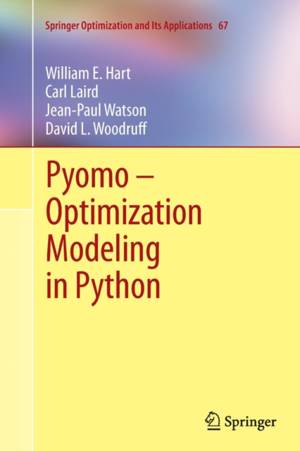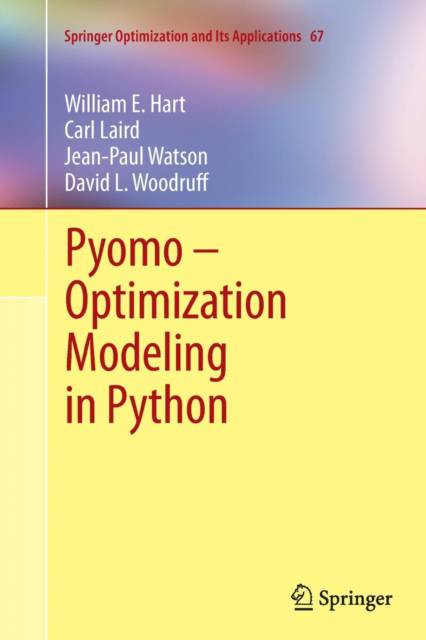
- Afhalen na 1 uur in een winkel met voorraad
- Gratis thuislevering in België vanaf € 30
- Ruim aanbod met 7 miljoen producten
- Afhalen na 1 uur in een winkel met voorraad
- Gratis thuislevering in België vanaf € 30
- Ruim aanbod met 7 miljoen producten
Zoeken
Pyomo - Optimization Modeling in Python
William E Hart, Carl Laird, Jean-Paul Watson, David L Woodruff
€ 76,95
+ 153 punten
Omschrijving
This book provides a complete and comprehensive reference/guide to Pyomo (Python Optimization Modeling Objects) for both beginning and advanced modelers, including students at the undergraduate and graduate levels, academic researchers, and practitioners. The text illustrates the breadth of the modeling and analysis capabilities that are supported by the software and support of complex real-world applications. Pyomo is an open source software package for formulating and solving large-scale optimization and operations research problems. The text begins with a tutorial on simple linear and integer programming models. A detailed reference of Pyomo's modeling components is illustrated with extensive examples, including a discussion of how to load data from data sources like spreadsheets and databases. Chapters describing advanced modeling capabilities for nonlinear and stochastic optimization are also included. The Pyomo software provides familiar modeling features within Python, a powerful dynamic programming language that has a very clear, readable syntax and intuitive object orientation. Pyomo includes Python classes for defining sparse sets, parameters, and variables, which can be used to formulate algebraic expressions that define objectives and constraints. Moreover, Pyomo can be used from a command-line interface and within Python's interactive command environment, which makes it easy to create Pyomo models, apply a variety of optimizers, and examine solutions. The software supports a different modeling approach than commercial AML (Algebraic Modeling Languages) tools, and is designed for flexibility, extensibility, portability, and maintainability but also maintains the central ideas in modern AMLs.
Specificaties
Betrokkenen
- Auteur(s):
- Uitgeverij:
Inhoud
- Aantal bladzijden:
- 238
- Taal:
- Engels
- Reeks:
- Reeksnummer:
- nr. 67
Eigenschappen
- Productcode (EAN):
- 9781489993250
- Verschijningsdatum:
- 13/04/2014
- Uitvoering:
- Paperback
- Formaat:
- Trade paperback (VS)
- Afmetingen:
- 156 mm x 234 mm
- Gewicht:
- 362 g

Alleen bij Standaard Boekhandel
+ 153 punten op je klantenkaart van Standaard Boekhandel
Beoordelingen
We publiceren alleen reviews die voldoen aan de voorwaarden voor reviews. Bekijk onze voorwaarden voor reviews.











